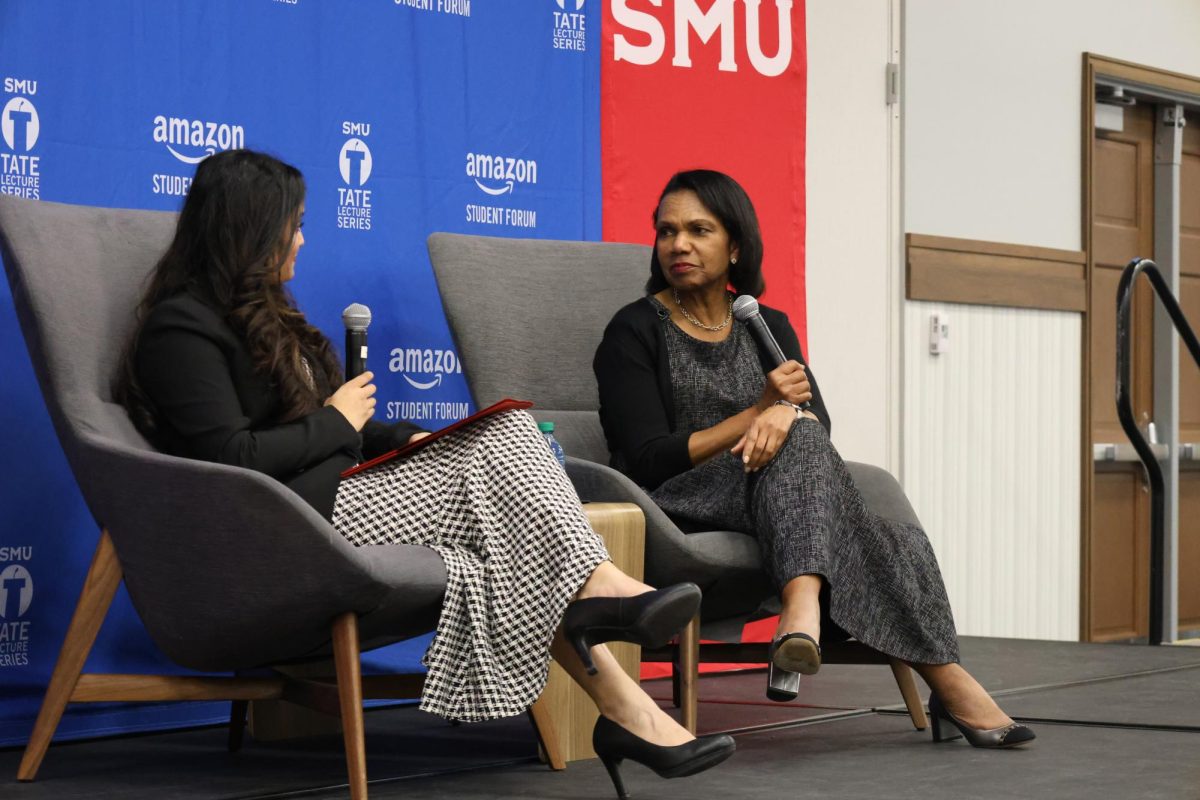
Lt. Gov. David Dewhurst (left) makes his final remarks as Tom Leppert listens on during the Belo Debate April 13 in Dallas. (Associated Press)
On February 29, a panel of three federal judges approved electoral maps for Texas’s May 29 primary. The congressional redistricting was challenged by activists who claimed the Republican-dominated state legislature was gerrymandering to the detriment of Latino candidates.
Before the electoral maps were contested, the Texas primary was scheduled for Super Tuesday on March 6. For the candidates running to fill U.S. Sen. Kay Bailey Hutchison’s open seat, the postponement has varying implications. With nine candidates campaigning for the seat, sources say it is unlikely that frontrunner Lt. Gov. David Dewhurst will be able to avoid a run-off election by scoring a majority of votes.
The candidates trailing Dewhurst include Tea Party favorite and former state solicitor general Ted Cruz, former Dallas Mayor Tom Leppert and Craig James, formerly with ESPN. For these candidates it has become a race for second with the hope that Dewhurst will not receive 50 percent or more of the primary votes.
In mid January, Public Policy Polling reported 36 percent of voters supporting Dewhurst, 18 percent for Cruz, 7 percent for Leppert and 4 percent for James.
But the most recent Public Policy Polling report, released on April 25, reflects the benefit of an extended primary for Dewhurst’s opposition. The poll reports Dewhurst at 38 percent, Cruz at 26 percent, Leppert at 8 percent and James at 7 percent.
Dewhurst’s strong lead in the polls is primarily due to his name recognition as lieutenant governor. This advantage is likely to ensure his position in a run-off, but does not necessarily mean he will win the Senate seat in a run-off election. Many voters who turn out during the primary will not return for a run-off election. Voter turnout during run-offs are substantially lower.
For Cruz, Leppert and James, the delayed primary is likely to only help their campaigns.
According to former Executive Director of the Dallas GOP and current Campaign Manager for Congressman Michael Burgess, Kim Garza Turner, more time will allow these candidates to campaign and expose their name to more voters. For a state as large as Texas, these candidates can use as much time as possible to gain voters and endorsements.
For Dewhurst, Turner believes that his campaign is likely to continue running ads while limiting appearances. She also suggests that Dewhurst will avoid debates as much as possible. By attending debates, the frontrunner will only bring more press to an event that will help the opposing candidates gain media coverage.
Being the first Hispanic solicitor general, Cruz is likely to gather Hispanic voters that turnout for the Republican primary. Cruz, whose father moved to Texas from Cuba, lives with his family in Houston. He was also named one of the 50 Most Influential Minority Lawyers in America by the National Law Journal.
Cruz is the Tea Party favorite and appears to be Dewhurst’s greatest threat.
Tea Party voters are known for being dedicated voters with strong grassroots organization. With the Tea Party vote behind him, Cruz has a good chance at winning, especially if the two candidates enter a run-off election.
According to Leppert’s spokesman, Daniel Keylin, the delayed primary date has helped his campaign. The additional time has helped the campaign gain more finances than any of the other campaigns.
More time and more money “will help get Tom’s message out and let voters know about his experience as a proven job creator and conservative businessman,” remarks Keylin.
Dewhurst’s challengers are likely to attack his record as lieutenant governor of Texas.
While Dewhurst’s past government involvement provides name recognition, for many conservative Republican voters his record contradicts his campaign platform.
Previous County Chairman of the Denton County Republican Party (1996-2002), attorney Richard Hayes is not buying Dewhurst’s promises.
Hayes points out that Dewhurst is promising to push for legislation that will cut spending, but in the past 10 years the Texas state budget has risen just over 80 percent.
Dewhurst has been in office for 8 of those 10 years.
If Dewhurst’s opposing candidates are able to articulate these inconsistencies, sources suggest that victory for Dewhurst is not absolute.















